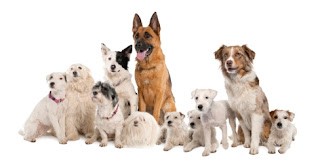How to Choose the Right Dog for You
"Bringing a canine companion into the home should never be a spur-of-the-moment decision. Whatever the breed, a dog will require a great deal of care if it is to be happy, well-adjusted, and healthy. A dog, in most cases, is something like a child in the care and devotion it needs. Buying or adopting a dog is a commitment that should last for years.
Dogs have evolved with humans over the course of tens of thousands of years; not only as servants for hunting or guarding, but as companions who provide and need emotional support. In order to assure that the relationship will work out well for both the human and the dog, it's necessary for the human side of the equation to find out all they can about any breed in which they are interested. While it's quite true that 'love at first sight' has been proven to be successful many times, it can also wind up with a disappointed owner and a dog in rescue or a shelter.
Dogs are available in a wide range of sizes, from tiny Chihuahuas, Chins, and Yorkies weighing less than 5 pounds to 300+ pound St. Bernards or English Mastiffs, and everything in between.
The space available in your home, and whether or not you have a yard, can have a bearing on which breed you're interested in. Dogs can live comfortably in an efficiency apartment or on a huge estate; you simply have to find the right match for your circumstances.
Some breeds, usually smaller ones, can live quite happily in a small apartment. The exercise needs of some dogs are minimal, and a walk around the block or down the street combined with some play indoors will be sufficient. Breeds such as French Bulldogs, Chihuahuas, Bichon Frises, and Papillons are all good choices either for an apartment or a house. Always keep in mind, though, that every dog needs to walk a bit daily to satisfy their need for patrolling. It may come as a surprise that a large breed of dog, the English Mastiff, is also a good choice for a more confined setting due to its calm temperament and moderate exercise needs.
Size can matter in other respects as well. The amount of food that a 350 pound dog will require daily is fairly prodigious; even a quality kibble will require about 10 cups of the food per day. It is unlikely that you would be able to skimp on costs by purchasing an economy brand; you would have to feed more of the cheaper food to provide adequate nutrition. Feeding a large, active dog properly can be expensive, so if you are considering a large or giant breed be sure that you will be able to keep up, monetarily, with your dog's appetite.
Temperament is one of the most important aspects of any dog, and possibly the most important of all. This refers to how well the dog will be able to interact with humans, dogs, and other animals.
Dogs are highly intelligent animals, but as with every living creature, some of their actions will be governed by instinct. Instinct can be simply defined as inborn reactions that require no conscious thought. A person doesn't have to think about pulling his or her hand out of a flame, instinct does this immediately. Dogs from aggressive breeds such as Fila Brasilieros, Rottweilers, or Dobermans will tend to act more aggressively when an instinctive response is given. Easy going breeds like English or French Bulldogs will generally just sigh if a child accidentally hurts them, while a Doberman is more likely to lash out with teeth instinctively.
In addition to instinctive reactions, the temperaments of the different breeds can vary widely. Companion dogs have been developed over the centuries as dogs that have pleasing, warm temperaments, and who are able to get on well with humans. Hunting dogs generally have good temperaments too - they have been working in close association with their human masters since the first proto-dog crept up to the fire. While active in the field, hunting dogs are calm around the home, good natured, and get along well with children.
Herding and herd guardians are usually more aloof than companion or hunting dogs. Herding dogs, such as Border Collies, may not make good household companions because of their extremely high energy level; they need to be active almost constantly or will suffer neurotic effects that can lead to aggression and destructiveness. Herd guardians, including Anatolian Shepherds, Ovtcharkas, and Komondorak will bond most strongly to a flock of sheep or goats, and are usually more interested in these animals than they will be to humans. Herd guardians, who live with their flock, will attack anything they perceive to be a threat to the animals they are guarding, so do not make the best match for an urban or suburban setting.
Finding the right match for your particular circumstances when you want a dog is easy as long as you spend some time looking into the breeds before you buy. A good deal of trouble and heartbreak could be avoided if the 'thinking' side of the equation, the human, did some research beforehand and made an honest assessment of their resources, needs, and time."

Belum ada Komentar untuk "How to Choose the Right Dog for You"
Posting Komentar